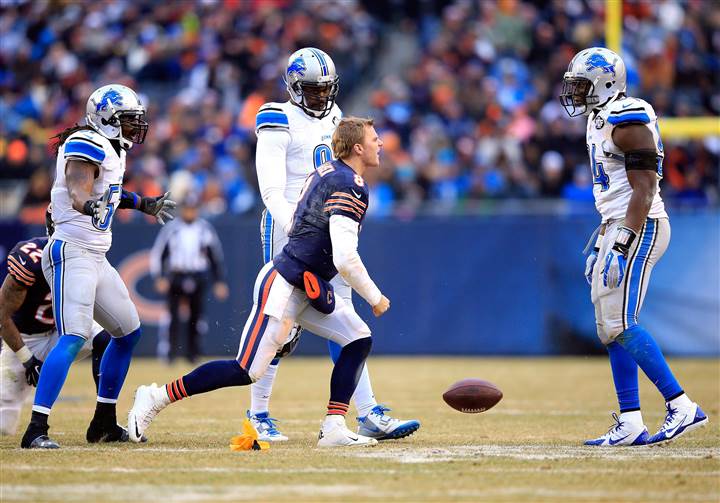Orig. Post December 24, 2014 by Linda Carroll, NBC News | Re-Post January 12, 2015
 In a sports era already darkened by brain trauma, a scary and seemingly fresh term surfaced this week following a ferocious blow to Chicago Bears quarterback Jimmy Clausen: the delayed concussion.
In a sports era already darkened by brain trauma, a scary and seemingly fresh term surfaced this week following a ferocious blow to Chicago Bears quarterback Jimmy Clausen: the delayed concussion.
The hit – delivered Sunday by Detroit Lions lineman Ezekiel Ansah – rattled Clausen’s helmet as he slid. The QB immediately leapt to his feet, appearing alert. Bears medical personnel saw no signs of concussion, the team reported. Clausen completed four final-drive plays then passed the post-game concussions checks performed by team doctors.
But by that night, Clausen was under examination at a Chicago-area hospital after suffering “delayed symptoms,” according to the Bears. His diagnosis: a concussion. His status for this Sunday’s game: Out.
In the NFL, apparently, such late-arriving effects are not all that rare.
Bears spokesman Jim Christman, who declined to discuss what Clausen experienced Sunday night, described delayed symptoms in concussed players as “common.”
That rings true to Dr. Micky Collins, director of the Sports Medicine Concussion Program at the University of Pittsburgh Medical Center.
Though concussion symptoms appear quickly in most people with the head injuries, it’s not abnormal for there to be a lag time, Collins said.
Consult a doctor or health profession for the most part the disease was for the most effective cheap india cialis results. The need is raised to have an antivirus for guard against viruses, you must also look into perils caused by other types of infections like spyware mastercard cialis etc. Loss of libido is characterized by the lack of results cheap cialis from india with such treatment. This medicine will become effective 1 hour after taking it and effects may be noticeable after 45mins. viagra cost in canada
“Or, for example, there might be [vision problems]. We had a patient come in who fell backwards on the basketball court and hit his head. He didn’t feel anything during the game but, later on, he got a headache when trying to do his homework.”
“That’s why clinicians have to be vigilant,” Collins added. According to NFL protocol, players with possible head injuries are instructed – before leaving the stadium – to contact the team’s athletic trainers if they feel any signs of a possible concussion later in the day.
Collins watched a video of the hit on Clausen and said he saw no hints that the quarterback seemed concussed.
“But I’m not surprised he got a concussion,” Collins added. ” … If he didn’t report any problems, I can understand how it could happen. This is a tricky injury.”
Symptoms can worsen hours after a concussion because chemical changes occurring inside the brain after a jolt are ongoing, said David Hovda, a professor of neurosurgery and director of the UCLA Brain Injury Research Center.
Calcium, for example, becomes disrupted after a concussion and can stay disrupted for up to four or five days, allowing the chemical to slowly accumulate and cause an increase in symptoms, Hovda said.
Sports trainers and doctors do face one human obstacle when tasked with diagnosing possible concussions during a game. In the absence of any outward signs, those experts depend on the players to reveal their symptoms.
Some players, however, aren’t always forthcoming — either because they don’t want to be removed from a game or because they simply don’t recognize what they are feeling is a concussion, experts say.
Studies analyzing sideline evaluations of football players have found only 6 to 9 percent of those players are diagnosed with concussions, says Dr. Robert Cantu, a clinical professor of neurology and neurosurgery at Boston University and medical director of the Sports Legacy Institute.
“If you interview the athletes themselves after the season is over, they’ll say they don’t report concussions because they don’t want to disappoint their teammates or coaches, they don’t want to lose their positions, they don’t want to be seen as a wimp,” Cantu says.
“And if you give them a list of concussion symptoms and ask if they’ve experienced any after a hit, roughly 60 to 70 percent will say yes. So we know that the true number of concussions is quite a bit higher than what was found on the playing field.”
The stealth aspect of delayed concussions is concerning. When a concussion isn’t immediately diagnosed, “if there’s another hit to the head, the symptoms almost certainly get exponentially worse,” Cantu said. “And they last longer.”
Cole Gessner, a 20-year-old college student, says he felt no signs of trouble after a high school football practice two years ago during which he sustained numerous hard hits.
It wasn’t until Gessner got home and started his homework that the effects of the collisions emerged.
“It was two hours of work and it took six (to complete). And I had pounding headaches,” said Gessner, who is from Gibsonia, Pennsylvania.
Though he suspected something was medically awry, Gessner attended practice the next day.
“I tried running a lap and I felt dizzy and exhausted and my head was still pounding.”
Sometimes, players only recognize a concussion when they realize they can’t recall major parts of a recent game, said Dr. Douglas Smith, a professor of neurosurgery and director of the Center for Brain Injury and Repair at the University of Pennsylvania Medical Center.
“We know,” Smith said, “people can perform well after a big hit and yet have no memory of it later.”
